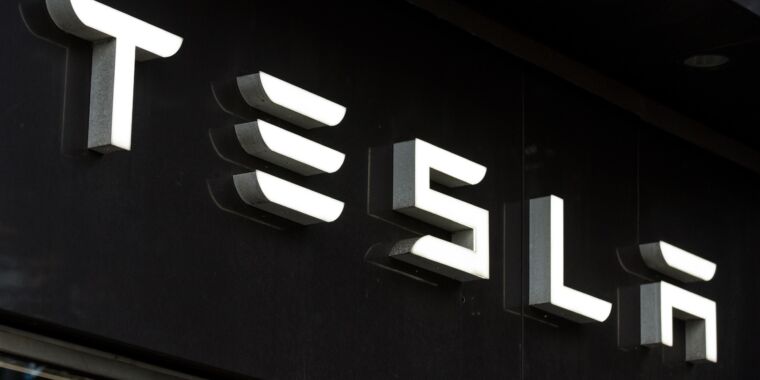Getty Images | SOPA Images
A group of Tesla investors yesterday sued Elon Musk, the company, and its board members, alleging that Tesla was harmed by Musk’s diversion of resources to his xAI venture. The diversion of resources includes hiring AI employees away from Tesla, diverting microchips from Tesla to X (formerly Twitter) and xAI, and “xAI’s use of Tesla’s data to develop xAI’s own software/hardware, all without compensation to Tesla,” the lawsuit said.
The lawsuit in Delaware Court of Chancery was filed by three Tesla shareholders: the Cleveland Bakers and Teamsters Pension Fund, Daniel Hazen, and Michael Giampietro. It seeks financial damages for Tesla and the disgorging of Musk’s equity stake in xAI to Tesla.
“Could the CEO of Coca-Cola loyally start a competing soft-drink company on the side, then divert scarce ingredients from Coca-Cola to the startup? Could the CEO of Goldman Sachs loyally start a competing financial advisory company on the side, then hire away key bankers from Goldman Sachs to the startup? Could the board of either company loyally permit such conduct without doing anything about it? Of course not,” the lawsuit says.
Tesla and Musk have touted artificial intelligence “as the key to Tesla’s future” and described Tesla as an AI company, the lawsuit said. By founding xAI, Musk started a competing company “and then divert[ed] talent and resources from his corporation to the startup,” with the apparent approval of Tesla’s board, the lawsuit said.
After founding xAI in March 2023, “Musk hired away numerous key AI-focused employees from Tesla to xAI” and later diverted Nvidia GPUs from Tesla to X and xAI, the lawsuit said. The GPU diversion was recently confirmed by Nvidia emails that were revealed in a report by CNBC.
GPU diversion
Before founding xAI, “Musk stated that Tesla needed more Nvidia H100 GPUs than Nvidia had available for sale, a common problem in the AI industry… After Musk established xAI, however, he began personally directing Nvidia to redirect GPUs from Tesla to xAI and X,” the lawsuit said.
The investors suing Musk and Tesla don’t buy Musk’s justification. “For his part, Musk dubiously claimed in a post on X following the publication of the CNBC report that, contrary to his prior public representations about Tesla’s appetite for Nvidia hardware, ‘Tesla had no place to send the Nvidia chips to turn them on, so they would have just sat in a warehouse,'” the lawsuit said.
The complaint says that a pitch deck to potential investors in xAI said the new firm “intended to harvest data from X and Tesla to help xAI catch up to AI companies OpenAI and Anthropic. X would provide data from social media users, and Tesla would provide video data from its cars.”
“It is apparent that Musk has pitched prospective investors in xAI partly by exploiting information owned by Tesla,” the lawsuit also said. “On information and belief, Musk has already or intends to have xAI harvest data from Tesla without appropriately compensating Tesla even though X has already been provided xAI equity for its data contributions. None of this would be necessary if Musk properly created xAI as a subsidiary of Tesla.”
We contacted Tesla today and will update this article if the company provides a response to the lawsuit. The filing of the complaint was previously reported by TechCrunch.
Same court nullified Musk’s pay
The Delaware Court of Chancery is the same one that nullified Elon Musk’s 2018 pay package following a different investor lawsuit. Tesla shareholders yesterday re-approved the $44.9 billion pay plan, with 72 percent voting yes on the proposal, but the re-vote doesn’t end the legal battle over Musk’s pay. Tesla shareholders also approved a corporate move from Delaware to Texas, which was proposed by Musk and Tesla after the pay-plan court ruling.
That drama factors into the lawsuit filed yesterday. After the pay ruling that effectively reduced Musk’s stake in Tesla, “Musk accelerated his efforts to grow xAI” by “raising billions of dollars and poaching at least eleven employees from Tesla,” the new lawsuit said. The lawsuit also points to Musk’s threat “that he would only build an AI and robotics business within Tesla if Tesla gave him at least 25% voting power.”
The lawsuit accuses Tesla’s board of “permit[ting] Musk to create and grow xAI, hindering Tesla’s AI development efforts and diverting billions of dollars in value from Tesla to xAI.” The board’s failure to act is alleged to be “an obvious breach of its members’ unyielding fiduciary duty to protect the interests of Tesla and its stockholders.”
The Tesla board members’ close ties to Musk could play a key role in the case. In the pay-plan ruling, Delaware Court of Chancery Judge Kathaleen McCormick found that most of Tesla’s board members were beholden to Musk or had compromising conflicts. The lawsuit filed yesterday points to the court’s previous findings on those board members, including Kimbal Musk, Elon Musk’s brother; and James Murdoch, a longtime friend of Musk.








:max_bytes(150000):strip_icc()/roundup-writereditor-loved-deals-tout-f5de51f85de145b2b1eb99cdb7b6cb84.jpg)


